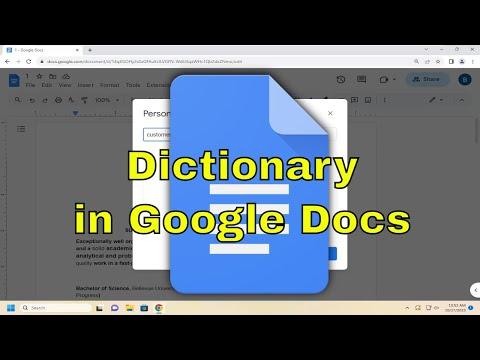It was a crisp autumn morning when I first encountered a problem that seemed deceptively simple but turned out to be surprisingly complex. I was working on a research paper in Google Docs, striving to ensure that every detail was perfect. As someone who takes great pride in using precise language, I had begun to notice that some words, especially those unique to my field or specific to my style, were frequently flagged as errors by the built-in spell checker. This was becoming increasingly frustrating, as it disrupted my workflow and made it difficult to focus on the content itself.
I found myself in a constant battle with the spell checker, which seemed to lack an understanding of the specialized terminology I was using. I needed a solution that would allow me to maintain my productivity without compromising on the quality of my work. That’s when I stumbled upon the concept of a personal dictionary in Google Docs. I quickly realized that this feature could be the key to resolving my issue, but I had no idea where to begin.
After some initial research, I discovered that Google Docs does indeed offer a way to add custom words to a personal dictionary. This would allow me to add all the specific terms and names that were being flagged as errors, effectively teaching the spell checker to recognize and accept these words as correct. I was excited by the prospect of having a more tailored and less intrusive spell-checking experience.
To get started, I first opened the Google Docs document where I had been experiencing the issues. The process of adding words to the personal dictionary was not immediately obvious, so I had to dive into the settings and options to figure it out. I navigated to the “Tools” menu, where I found the “Preferences” option. Clicking on it revealed a range of settings related to document formatting and spell checking.
In the Preferences window, there was a section labeled “Personal dictionary.” This was where I could add words that I wanted to be recognized by the spell checker. I clicked on the “Add” button, which opened a dialog box where I could type in the words I wanted to include. I began by entering terms from my research paper, such as technical jargon and proper nouns, that were frequently flagged. Once I had added all the necessary words, I clicked “OK” to save the changes.
To ensure that the personal dictionary was working as expected, I went back to my document and reviewed it. The words that had previously been marked as errors were now accepted without any issues. This was a significant relief, as it allowed me to focus on writing and editing without being constantly interrupted by false error messages. The personal dictionary had effectively solved the problem, making my writing process much smoother.
However, I soon realized that my needs were more dynamic than I had initially anticipated. As my research progressed, new terms and names were continually being introduced. This meant that my personal dictionary needed to be updated regularly to stay current with the evolving content of my work. Fortunately, Google Docs made it easy to manage the personal dictionary, allowing me to add or remove words as needed.
When new words were introduced into my documents, I repeated the process of adding them to the personal dictionary. This became a routine part of my editing workflow, ensuring that the spell checker remained accurate and helpful. The ability to customize the dictionary to fit my specific needs greatly enhanced my efficiency and reduced the frustration I had previously experienced.
Moreover, I found that maintaining a personal dictionary was not only useful for dealing with specialized terminology but also for managing typos and variations in spelling that were unique to my writing style. For instance, if I had a preferred spelling or variant of a word that was not commonly used, I could add it to the dictionary to ensure consistent recognition throughout my documents.
As time went on, I began to appreciate the value of the personal dictionary feature even more. It became an essential tool in my writing arsenal, allowing me to produce polished and professional documents with greater ease. The time and effort I had invested in setting up and maintaining the dictionary paid off in the form of improved productivity and fewer interruptions during the writing process.
In addition to the practical benefits, the experience taught me a valuable lesson about the importance of customizing tools to fit my needs. While Google Docs offered a range of built-in features, it was the ability to personalize these features that truly made a difference. By leveraging the personal dictionary, I was able to overcome a significant challenge and enhance my overall writing experience.
Looking back, I am grateful for the initial challenge that led me to discover the personal dictionary feature. It turned out to be a simple yet powerful solution that made a profound impact on my work. The ability to tailor the spell checker to my specific requirements was a game-changer, and it underscored the importance of exploring and utilizing the full range of tools available in any software.
